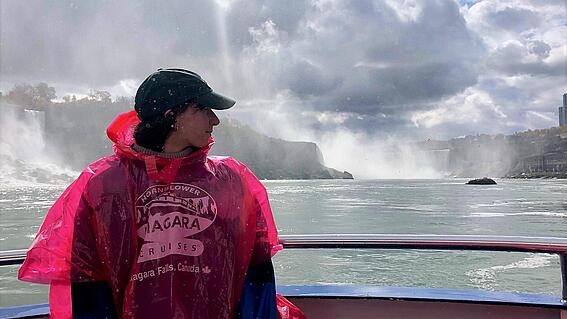Why is your research topic relevant in this day and age?
As climate change progresses, more and more areas around the globe will become uninhabitable. This will force an increasing number of people to leave their homes and migrate to other places. But while this phenomenon of climate change-induced migration has already been discussed for more than two decades, so-called climate migrants still find themselves in a legal lacuna. Human Rights Law can provide protection to this vulnerable group, even if such protection is limited and should not be seen as a ‘panacea’.
How do you hope to contribute to international legal discourse with your work?
The role of the law, in particular of human rights law, in mitigating climate change is highly debated and rapidly evolving. In the past three years alone, numerous decisions have been handed down that address and further advance the role of human rights in the context of climate change.
With my research, I hope to increase the understanding of potentials and limits of a human rights-based approach to climate migration by analysing the conditions and challenges in applying traditional principles such as non-refoulement to new phenomena like climate change.
What motivated you to pursue a research stay in Canada?
Since the phenomenon of climate migration is not discussed much in German academia, I hoped that a research stay would provide me with a valuable exchange with experts in this field. My supervisor at McGill University, Professor François Crépeau, was a perfect match in that regard.
Professor Crépeau is an expert in migration and refugee law, gained valuable practical insights during his work as the former UN Special Rapporteur on the Human Rights of Migrants and conducts research on climate change-induced migration.
Moreover, McGill University enjoys an excellent reputation also beyond Canadian borders, especially its Faculty of Law is known for its pluralist, critical, and interdisciplinary research approach. McGill University was therefore the ideal place for a research stay to take a critical perspective on the role of human rights in addressing climate migration. Lastly, I was also interested in learning on Canadian perspectives on migration since it is perceived as one of most immigration-friendly countries in the world.
Could you share some impressions from your time abroad?
Upon my arrival at the faculty, I was warmly welcomed by Professor Crépeau and the other faculty members. I also got permission to audit a couple of courses as a guest, which contributed to a broader understanding of my research areas. Next to auditing the classes and working on my dissertation, I regularly discussed my work with my supervisor and attended some of the numerous faculty events (e.g., on the legality of the use of autonomous weapons with Professor Kevin Jon Heller or a lecture series on the rights of indigenous peoples).
I was very inspired by the vibrant academic environment at McGill, which is strongly characterised by its open, diverse, and critically thinking intellectual community. I got to know students and researchers from Canada and all over the world, with whom I was able to engage in academic and cultural exchange.
I could also not miss some typical Canadian experiences, such as cheering for the Montréal ‘Habs’ at an ice hockey game or trying the national dish Poutine. Last but not least, I took the opportunity to explore Montréal and other parts of Canada on the weekends. The season of my stay was ideal to benefit from mild weather and the famous Indian Summer.
I would thus like to take the opportunity to thank Bucerius Law School for funding my research stay as well as Professor Mehrdad Payandeh, Professor François Crépeau and McGill University for making it possible.



